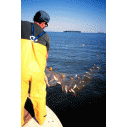Tuesday, March 03, 2009
Loss of small fish may be starving the oceans
 According to a report by Oceana, there is widespread malnutrition in fish, marine mammals and seabirds because of the global depletion of the small fish they need to survive. These "prey fish" underpin marine food webs and are being steadily exhausted by heavy fishing, increasing demand for aquaculture feed, and climate change.
According to a report by Oceana, there is widespread malnutrition in fish, marine mammals and seabirds because of the global depletion of the small fish they need to survive. These "prey fish" underpin marine food webs and are being steadily exhausted by heavy fishing, increasing demand for aquaculture feed, and climate change. The report finds that 7 of the top 10 fisheries in the world target prey fish. These fisheries have emerged as populations of bigger fish have become overexploited and depleted. The report concludes that the impacts of fishing activity over the past decades has been so great that the nearly all prey fisheries now cannot withstand increased fishing pressure. It also finds that aquaculture is increasingly the driver behind overfishing of prey fish, as salmon, tuna and other carnivorous farmed fish become the fastest growing seafood products in the world. Changing ocean temperatures and currents caused by climate change also make prey fish populations more vulnerable.
Ricardo Aguilar, Director of Investigation for Oceana Europe, says: "When it comes to managing a fishery or talking about overexploitation, we often forget that the disappearance of one species due to overfishing has severe impact on stocks of other species. A clear example is bluefin tuna, which disappeared from Norwegian coasts after herring populations collapsed. Nowadays the absurdity is that both tuna and its prey are overexploited in order to feed these very tunas in fattening cages".
Oceana conclude that more responsible management is needed to prevent predators from going hungry. It proposes a series of measures including a moratorium on new fisheries targeting prey species, conservative catch limits for existing fisheries, first priority for the needs of ocean predators and stopping fishing for prey in predator breeding hotspots.
Further Reading: Hungry Oceans Report
-
What do you think of this news item? Join a discussion.
Labels: environment, fish, SCUBA News